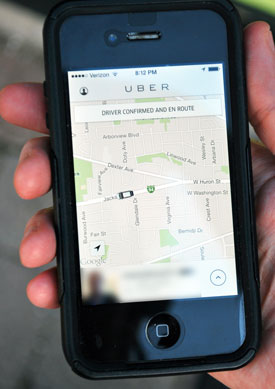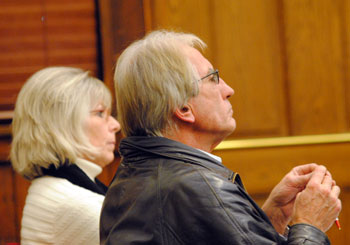Taxicab Board Considers Rates, Drivers
Ann Arbor taxicab board meeting (May 22, 2014): Two topics addressed by the board at its April 23, 2014 meeting received additional conversation this month. First, the board discussed the possibility of deregulating taxicab fares, or setting them at a much higher maximum. The board also continued discussing whether to recommend that the city council enact an ordinance to regulate all drivers for hire – taxicab drivers, limo drivers, as well as those who drive for Uber and Lyft.

Screen of iPhone showing Uber vehicle responding to request for a pickup on May 24. The resulting trip – from Jackson & Maple to Liberty & Main – was calculated by Uber as costing $8.
Both topics will also be considered at the board’s next meeting on June 26.
Consideration of a general driver-for-hire ordinance comes in reaction to the recent entry of Uber and Lyft into the Ann Arbor market. However, taxicab board chair Michael Benson stressed during the meeting that the point of the possible new ordinance was not to “target” Uber and Lyft, but rather to ensure that all drivers for hire are registered with the city. Those two companies, which coordinate drivers and passengers through software applications, have been sent cease-and-desist letters by the Ann Arbor city attorney’s office – for aiding and abetting the violation of a state statute regulating limousines. [.pdf of cease-and-desist sent to Lyft] [.pdf of cease-and-desist sent to Uber]
But the board heard from a University of Michigan student during public commentary time, who reported that the cease-and-desist letters, dated May 14, 2014, were having no impact – as he’d used one of the services three times the previous evening. In the course of his remarks, the UM business undergrad outlined several advantages of Uber and Lyft, including price, convenience and efficiency.
The board had voted at its April 23 meeting to ask the city attorney’s office to draft general driver-for-hire ordinance language for consideration at its May 22 meeting, but that draft was not yet available.
So at its next meeting on June 26, the board is expecting two possible proposals to be ready for consideration: (1) a new rate structure proposal; and (2) a draft ordinance on regulating all drivers for hire. The taxicab board could forward a recommendation to the city council to enact either proposal. A decision on enactment rests with the city council.
Discussion of the driver-for-hire issue at the May 22 meeting included themes familiar from the board’s April 23 conversation, mostly centering on the desire of board members to ensure public safety for patrons of businesses that operate on the public right-of-way. They want to ensure that drivers who are being compensated for their work are registered with the city, that their vehicles are inspected, and that they are adequately insured.
The rate changes to be considered by the board on June 26 come in the context of board interest in seeing the taxicab industry able to compete with limousine services, as well as with services with business models like those of Uber and Lyft. Currently the maximum rate in Ann Arbor is $3 to get in, $2.50 per mile, and 40 cents per minute waiting time.
Those maximum rates were last adjusted upwards three years ago, on May 16, 2011, in response to gas prices that had nudged past $4 per gallon. At that time, the taxicab board indicated it did not anticipate considering another rate change until the gas prices were over $5 for at least two consecutive months.
So the board’s thinking is not being driven by gas prices, which are currently between $3.75 and $4 in the Ann Arbor area. Instead, a possible increase in allowable fares is based on concern that the taxicab industry in Ann Arbor might not be able to survive unless taxis are allowed to charge more. Taxicab board member Robert Goeddel supported setting a significantly higher maximum, saying that if the taxicab industry does not survive, he does not want it to be because the basic costs of doing business can’t be covered.
City CFO Tom Crawford, who sits on the taxicab board as an ex officio member, noted that it’s a challenge to consider changes in rate structures at the same time as new entrants have come into the market – who have a lower cost structure than the taxicab industry. He expressed some concern that the result could be a “race to the bottom” for pricing that could work to destroy the taxicab industry.
In other business, the board elected its officers for the next year – an annual task. Benson and Stephen Kunselman were re-elected as chair and vice chair of the board. [Full Story]




